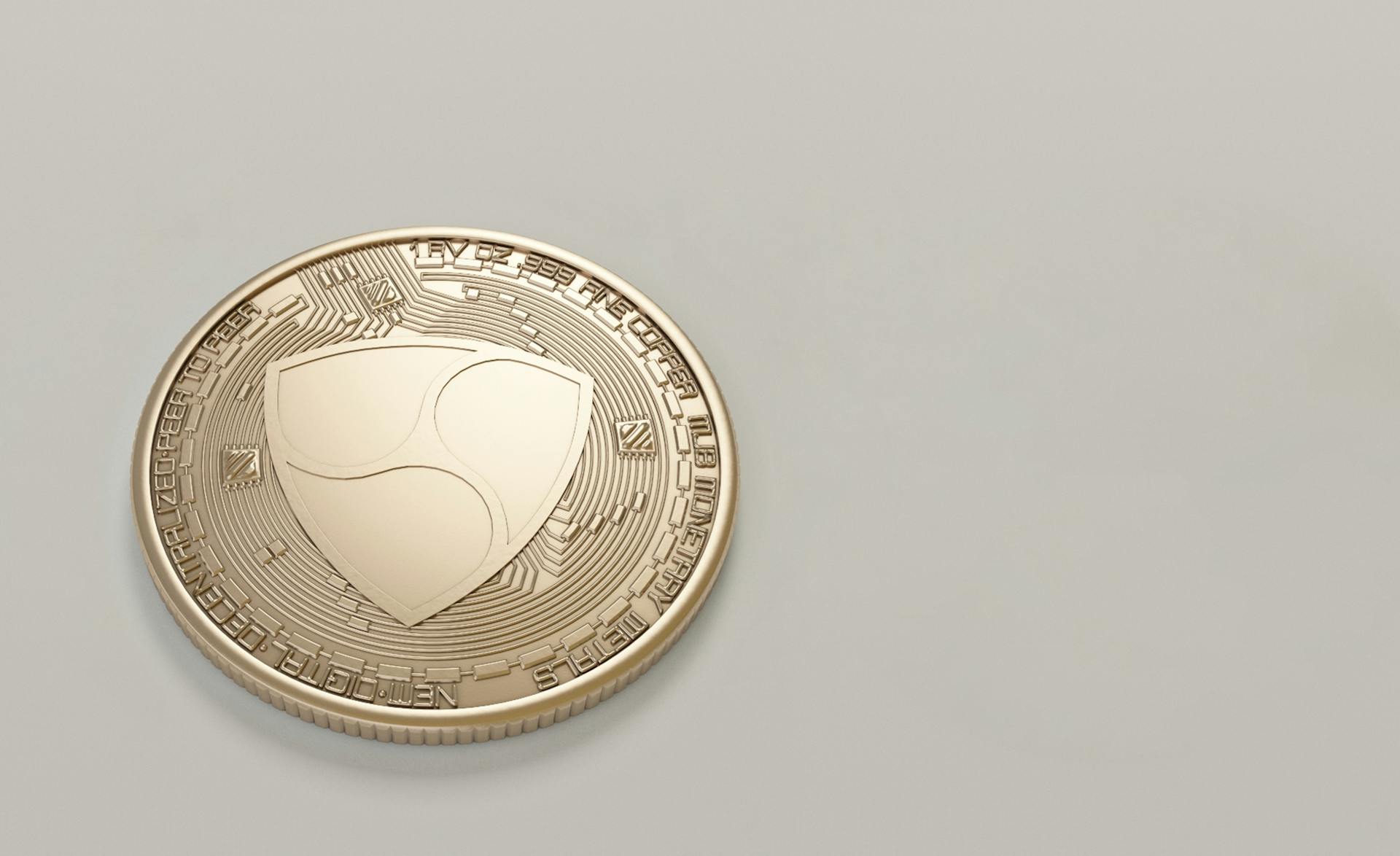
Chainlink is a decentralized oracle network that connects smart contracts to real-world data, enabling them to make decisions based on external information. This is a game-changer for the blockchain space.
Chainlink's architecture is designed to be modular, allowing it to integrate with various data sources and off-chain computation providers. This modularity is a key factor in its ability to provide accurate and reliable data.
At its core, Chainlink is a decentralized network of nodes, each of which runs a node software that connects to a data source or off-chain computation provider. This decentralized architecture ensures that data is accurate and unbiased.
Chainlink's use of a decentralized architecture also allows it to scale, as more nodes can be added to the network as demand increases. This scalability is crucial for a network that aims to provide data to a large number of smart contracts.
Suggestion: Bitcoin Network vs Lightning Network
What Is Chainlink?
Chainlink is a decentralized oracle network that communicates off-chain data to a blockchain. It's like a bridge between different systems, allowing them to talk to each other securely.
Chainlink's oracles enable computations on- and off-chain, supporting hybrid smart contracts and its cross-chain interoperability protocol. This means it can connect different blockchains and enable them to work together seamlessly.
Chainlink is hosted on the Ethereum platform, which uses the proof-of-stake operating protocol. This is a more energy-efficient way of validating transactions on the blockchain.
Chainlink is an open-source blockchain project, meaning anyone can view the project's code and contribute. This openness allows for a community-driven development process, where anyone can help shape the future of the project.
Consider reading: Bnb Smart Chain Bep20 Bitpay
History and Evolution
Chainlink was created in 2017 by Sergey Nazarov and Steve Ellis, who co-authored a white paper introducing the Chainlink protocol and network with Cornell University professor Ari Juels the same year.
The network was formally launched in 2019, and it acts as a "bridge" between a blockchain and off-chain environments, servicing smart contracts.
Chainlink integrated Town Crier, a trusted execution environment-based blockchain oracle, in 2018, which connects the Ethereum blockchain with web sources that use HTTPS.
If this caught your attention, see: Bitcoin Network
In 2020, Chainlink integrated DECO, a Cornell project co-created by Juels, which uses zero-knowledge proofs to allow users to prove information is true to a blockchain oracle without revealing sensitive information.
Chainlink has a maximum supply of 1 billion tokens, of which more than 608 million have been issued as of August 2024.
The Chainlink network grew by more than 215 projects in 2024, increasing it to more than 2,100 projects, and it has thousands of projects built using it as a source.
Chainlink uses a proof-of-stake mechanism to reward network participants for placing a freeze on the ETH they "stake" or put up as collateral for the chance to earn rewards.
Technology and Features
Chainlink's decentralized oracle network is an open-source technology infrastructure that allows any blockchain to securely connect to off-chain data and computation resources.
This means that Chainlink can fetch, validate, and deliver data from multiple sources onto blockchains to execute smart contracts.
Chainlink can be used for several different off-chain computation functions, including a verifiable random function (VRF) for decentralized gaming.
The verifiability of the random number generation ensures the in-game results are tamper-proof.
Using decentralization, trusted nodes, and cryptographic proofs, Chainlink connects accurate and available API/data to any smart contract.
Chainlink's VRF can be used for random number generation, which can be used in decentralized gaming.
You can also use Chainlink to bring election data on-chain using its data feeds.
Chainlink's verifiable random function can be used to generate random numbers, making it a reliable tool for smart contracts.
With Chainlink, you can connect your smart contracts to price data, including the latest price and historical price information.
This integration is known as Price Feeds Integration.
Chainlink also allows you to connect your smart contracts with any external API, thanks to its Third-party API Integration feature.
This feature leverages Chainlink's assistance to connect your smart contracts with any external API.
For your interest: Chainalysis Api
Smart Contracts and Oracles
Smart contracts are pre-specified agreements on the blockchain that evaluate information and automatically execute when certain conditions are met. They're like digital contracts that guarantee a high level of trust among parties.
A key limitation of smart contracts is their reliance on on-chain data, which is data found on the blockchain. To craft agreements beyond this data, they require off-chain data in an on-chain format.
Here are the fundamental concepts of smart contracts and oracles:
Oracles are crucial for bridging the on- and off-chain chasm, but a single centralized oracle creates a central point of weakness.
What It Does
Smart contracts are a type of contract that automatically executes when certain conditions are met. They are immutable and verifiable, making them a secure way to conduct transactions.
Traditionally, the data that defines these conditions has come from the blockchain itself. However, this can be limiting, as it only provides data that is stored on the blockchain.
Recently, oracles have been introduced to bring off-chain data to on-chain smart contracts. An oracle is a software that acts as an intermediary, translating data from the real world to smart contracts on the blockchain and back again.
However, a single centralized oracle creates the very problem a decentralized, blockchain-secured smart contract aims to solve. If the oracle is faulty or compromised, how would you know if your data is accurate?
Chainlink is a network of oracles that connect external data sources to blockchains. It eliminates the reliability issues that might occur if using only a single centralized source.
Here are the key benefits of using a decentralized oracle network like Chainlink:
- Decentralized: Chainlink is a network of oracles, not a single centralized source.
- Reliable: Chainlink uses a network of oracles to provide data, eliminating the risk of a single oracle being faulty or compromised.
- Secure: Chainlink uses extra secure hardware to ensure the data is accurate and trustworthy.
Oracles Bridge On- and Off-Chain
An oracle is software that acts as an intermediary, translating data from the real world to smart contracts on the blockchain and back again. This process is crucial for smart contracts to craft agreements beyond those that pertain to data found on the blockchain.
The difficulty in connecting outside information sources to blockchain smart contracts in a language that they both understand is one of the main limitations in how widely smart contracts can be used. This limitation is addressed by oracles, which provide a solution to bring off-chain data to on-chain smart contracts.
A single centralized oracle creates the very problem a decentralized, blockchain-secured smart contract aims to solve — a central point of weakness. If the oracle is faulty or compromised, how would you know if your data is accurate?
This is where decentralized oracles like Chainlink come into play. Chainlink is a network of oracles that connect external data sources to blockchains.
Here are the benefits of using decentralized oracles like Chainlink:
- Eliminates the reliability issues that might occur if using only a single centralized source.
- Provides a high level of trust among parties that the data is accurate and reliable.
- Guarantees the security and authenticity of the data.
Link Token and Ecosystem
The Link token is an ERC677 token, an extension of ERC-20, which is used to compensate node operators for their work on the Chainlink network. It's also used for deposits placed by node operators as required by contract creators.
Chainlink's native cryptocurrency, LINK, is pre-mined and largely withheld by the central issuer, with a fraction of the supply offered for sale to retail buyers in a controversial ICO. Tokens act as data payloads, feeding required data from off-chain sources to smart contracts.
Node operators use LINK to stake in the network, with the size of their stake influencing their likelihood of being chosen to fulfill requests. The Chainlink Reputation Contract considers a node's stake when matching nodes with requests for data.
Worth a look: Ether Proof of Stake Date
Link Tokens: Where They Fit In
Chainlink node operators are compensated with LINK tokens for their work, which are paid by Requesting Contract holders based on demand for the data they can provide and the current market for that data.
The size of a node's stake in LINK tokens is a key factor in determining which node is chosen to fulfill requests. A greater stake makes a node more likely to be chosen.
Chainlink node operators use LINK tokens to stake in the network, which demonstrates their commitment and incentivizes good service. This stake is also taxed if the node provides poor service.
LINK tokens can be bought and sold for fiat currency or other digital currencies, and they're built on Ethereum in accordance with the ERC-20 standard for tokens.
A unique perspective: Banking as a Service
Delphic DeFi
In the world of DeFi, there's a concept called Delphic DeFi that's gaining traction. A Delphic DeFi solution relies on blockchain oracles to provide trustworthy off-chain data to smart contracts.
Blockchain oracles act as a source of information that's not found on the blockchain itself. They're essentially a bridge between the blockchain and the real world.
To ensure the data they supply is trustworthy, these oracles need to be decentralized. This means they can't be controlled by a single entity, which helps prevent tampering with the information they provide.
Frequently Asked Questions
Is Chainlink build on Ethereum?
Yes, Chainlink's LINK token is built on the Ethereum platform, leveraging its protocols for secure and efficient operations. This integration enables LINK to be used for various purposes, including smart contract execution and network validation.
Sources
- https://en.wikipedia.org/wiki/Chainlink_(blockchain_oracle)
- https://www.leewayhertz.com/chainlink-blockchain-development-company/
- https://www.investopedia.com/chainlink-link-definition-5217559
- https://unchainedcrypto.com/what-are-blockchain-oracles/
- https://www.gemini.com/cryptopedia/what-is-chainlink-and-how-does-it-work
Featured Images: pexels.com


